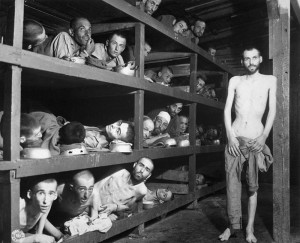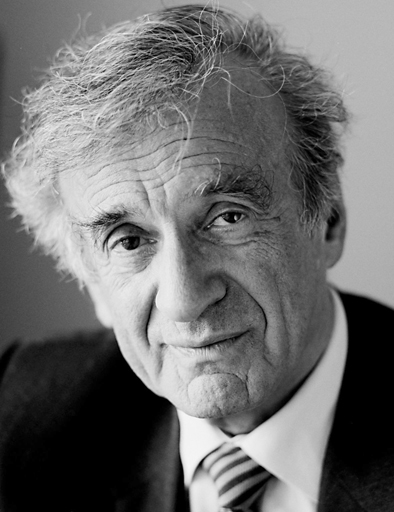Hero #146: Elie Wiesel … (01/08/16)
Born in September of 1928, Elie Wiesel is a Romanian-born Jewish-American professor and political activist. He is the author of 57 books, including “Night”, a work based on his personal experiences as a prisoner in the Auschwitz, Buna, and Buchenwald concentration camps. Indeed, the first image below is of the Buchenwald barracks that housed Wiesel — who can be seen in that image, second row from the bottom — 7th man from the left.
For ten years after the war, Wiesel refused to write about or discuss his experiences during the Holocaust. However, a meeting with the French author François Mauriac, the 1952 Nobel Laureate in Literature who eventually became Wiesel’s close friend, persuaded him to write the 900-page memoir “And the World Remained Silent”, which was then published in abridged form in Buenos Aires. Wiesel thereafter rewrote a shortened version of the same manuscript in French, which was published as the 127-page “La Nuit”, and later translated into English as “Night”.
In 1960 Arthur Wang of Hill & Wang agreed to pay a $100 pro-forma advance and published “Night” in the United States. The book sold just 1,046 copies over the next 18 months, but attracted interest from reviewers, leading to television interviews with Wiesel and meetings with literary figures such as Saul Bellow. “The English translation came out in 1960, and the first printing was 3,000 copies,” Wiesel said in an interview. “And it took three years to sell them. Now, I get 100 letters a month from children about the book. And there are many, many million copies in print.” Indeed, this is so, as “Night” has now been translated into 30 languages, and by 1997 was selling 300,000 copies annually in the United States alone. Film director Orson Welles approached Wiesel about making “Night” into a feature film, and yet Wiesel refused, noting that his widely read memoir would lose its more potent meaning if it were told without the silences present between its words.
Wiesel was awarded the Nobel Peace Prize in 1986 for speaking out against violence, repression, and racism. When giving him the award, the Norwegian Nobel Committee called him a “messenger to mankind”, stating that through his struggle to come to terms with “the utter contempt for humanity shown in Hitler’s death camps”, which led to his noble and “practical work in the cause of peace”, Wiesel delivered a powerful message “of atonement and human dignity” to all of humanity.
“The opposite of Love is not hate, it’s indifference … Mankind must remember that peace is not God’s gift to his creatures; peace is our gift to each other … This is the duty of our generation as we enter the twenty-first century — solidarity with the weak, the persecuted, the lonely, the sick, and those in despair. It is expressed by the desire to give a noble and humanizing meaning to a community in which all members will define themselves not by their own identity but by that of others.” ~ Elie Wiesel






 ;
;